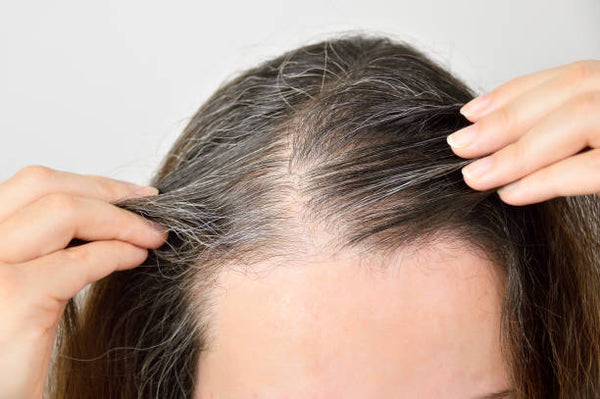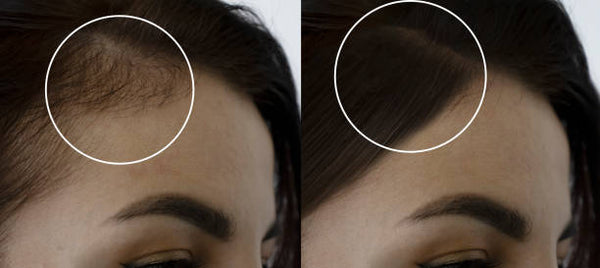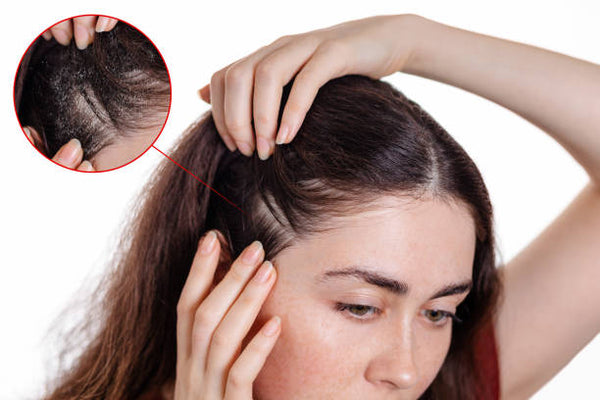Oxytocin's Role in Promoting Hair Follicle Growth and Stress Regulation

Oxytocin, often referred to as the "bonding hormone," is widely known for its role in emotional well-being and social bonding. Recent research suggests that this hormone might also play a crucial role in promoting hair follicle growth and counteracting stress-induced hair loss. By regulating the body’s stress response and supporting hair follicle health, oxytocin emerges as a potential game-changer in holistic hair care approaches.

The Connection Between Stress and Hair Loss
1. Cortisol's Impact on Hair Follicles
Chronic stress triggers the release of cortisol, a hormone that negatively impacts the hair growth cycle. Elevated cortisol levels can lead to hair follicle miniaturization, pushing hair follicles into the resting phase (telogen) prematurely, resulting in hair shedding.
2. Oxytocin as a Stress Regulator
Oxytocin counterbalances cortisol by promoting relaxation and reducing stress. This hormone's ability to create a calming effect on the body can help minimize stress-related hair loss.
Oxytocin's Role in Hair Follicle Growth
1. Stimulating Dermal Papilla Cells
Dermal papilla cells, located at the base of hair follicles, play a key role in regulating hair growth. Preliminary studies suggest that oxytocin can activate these cells, promoting the anagen (growth) phase of the hair cycle.
2. Encouraging Hair Follicle Renewal
Oxytocin's regenerative properties may help support the repair of damaged hair follicles, ensuring that they remain healthy and capable of producing strong, thick strands.
3. Improving Scalp Circulation
Oxytocin has been linked to improved blood flow, which may enhance the delivery of nutrients and oxygen to the scalp, supporting overall hair health.
The Science Behind Oxytocin's Hair Benefits
1. Anti-Inflammatory Effects
Oxytocin exhibits anti-inflammatory properties, which may help soothe scalp irritation and create an optimal environment for hair growth.
2. Strengthening Hair Bonds
While oxytocin indirectly influences hair health, it also supports the repair of damaged hair bonds by reducing stress, which is a key factor in bond weakening and hair breakage.
3. Promoting Cellular Health
By reducing oxidative stress, oxytocin supports the health of hair follicle cells, ensuring their longevity and function.
How Oxytocin Can Be Harnessed for Hair Care
1. Mind-Body Practices
Activities that boost oxytocin production, such as yoga, meditation, and physical affection, can complement a healthy haircare routine by reducing stress.
2. Topical Applications
While oxytocin itself is not yet widely available in topical formulations, future developments in haircare products might harness this hormone’s benefits for direct application to the scalp.
3. Balanced Lifestyle
Combining oxytocin-boosting practices with a nutritious diet and effective haircare products—like bond repair treatments—ensures comprehensive hair health.
Oxytocin and Bond Repair
Oxytocin's ability to regulate stress indirectly supports bond repair treatments, as stress-induced cortisol can weaken hair bonds over time. Incorporating oxytocin-boosting habits into your lifestyle enhances the results of bond-building products, ensuring stronger, healthier hair.
Final Thoughts
While research on oxytocin’s direct impact on hair follicle growth is still emerging, its stress-regulating properties make it a promising factor in holistic hair care. By reducing cortisol levels and promoting an environment conducive to hair growth, oxytocin serves as a natural ally in preventing stress-induced hair loss and supporting healthy hair.
FAQ
1. Can oxytocin directly regrow hair?
While oxytocin shows potential for stimulating hair follicle activity, its primary benefit lies in reducing stress and promoting a healthy scalp environment.
2. How can I naturally boost oxytocin levels?
Practices like physical touch, social bonding, meditation, and exercise are known to increase oxytocin levels.
3. Are there haircare products with oxytocin?
Currently, oxytocin is not a common ingredient in haircare products, but future innovations may incorporate it for scalp health.
4. Can stress reduction alone improve hair health?
Reducing stress is a crucial component of overall hair health but should be combined with proper nutrition and targeted treatments like bond repair for optimal results.
5. Is oxytocin safe for everyone?
Oxytocin is naturally produced in the body and is generally safe, but always consult with a healthcare professional before using any hormone-based therapies.




